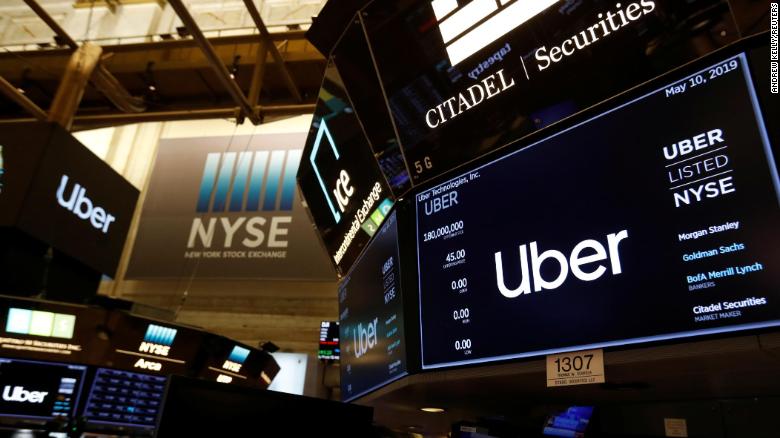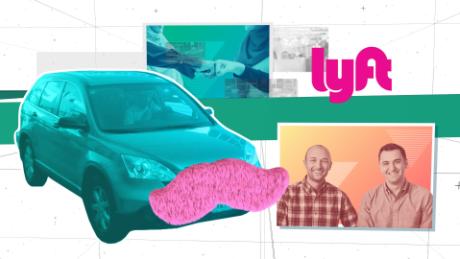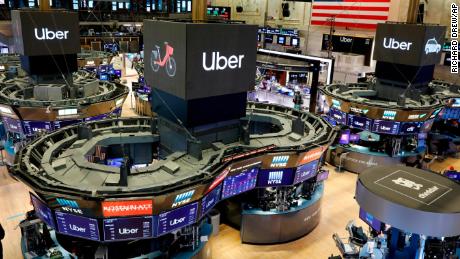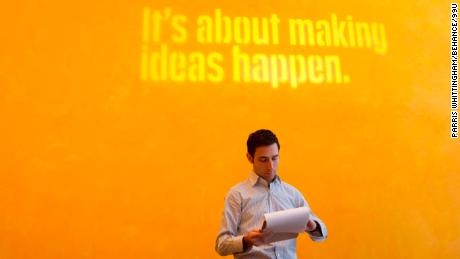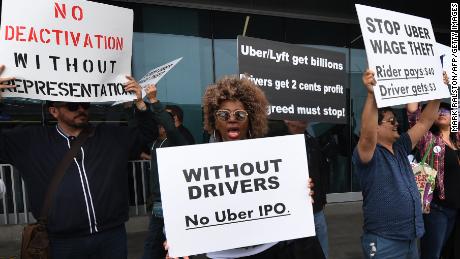New York (CNN Business)For nearly two years, Uber raced to rebuild its executive bench, overhaul its internal culture and repair its tarnished brand after suffering a long list of PR crises, all with the stated intention of being ready to go public in 2019.
But that wasn't enough to guarantee investor enthusiasm on Wall Street.
Shares of Uber fell more than 7% on its first day of trading Friday, marking a rocky Wall Street debut for a company that endured plenty of bumps on its long road to going public. Uber opened at $42 a share, below its IPO price of $45, and ended the day even lower at $41.57.
That disappointing first day performance sets Uber apart from the vast majority of its tech peers. In the past five years, only 10% of venture capital-backed US technology IPOs finished the first day in the red, according to data provided to CNN Business from Renaissance Capital, which manages IPO-focused exchange-traded funds.
Uber did succeed in raising $8.1 billion in one of the largest public offerings ever, a substantial war chest that should fund the company's expansion into new cities and service categories. But that amount was still at the low end of what Uber originally set out to raise.
The company's public debut comes at the end of a turbulent week filled with headlines about striking workers, steep losses in the ride-hailing industry and broader market jitters over an escalating trade war between the United States and China.
The less-than-stellar offering could prove to be just the first rude awakening Uber faces as it transitions to the public market. Over the last decade, Uber emerged as the poster child for a generation of technology startups that raised ŌĆö and lost ŌĆö unprecedented amounts of money while avoiding going public as long as possible. But that may not fly on Wall Street.
Lyft (LYFT), Uber's chief rival in the United States, has languished on the stock market since going public in late March. Shares in Lyft fell below their IPO price on their second day of trading and have continued to tumble since. The stock is now down about 25% from the IPO price.
Like Lyft, Uber has a history of bleeding money as it subsidizes the cost of rides and invests in an increasing array of transportation options. Uber lost $1.8 billion in 2018, more than any US startup has ever lost in the year prior to going public. The previous company to hold that dubious honor, however briefly: Lyft.
"It's amazing what [Uber has] built, but they are still not done doing it. They've been subsidizing the business," said Kathleen Smith, principal at Renaissance Capital. "The boat doesn't float on its own bottom."
As Smith points out, tech companies that have come to market in recent years with massive losses ŌĆö including Lyft and Snap ŌĆö are currently "not trading above their IPO price."
Uber, for its part, has pitched itself as an "Amazon for transportation" in that it offers a broad range of services, including meal deliveries and freight shipping. But the Amazon comparison can also be read as a clear signal to investors. Amazon lost money for years while investing to build a massive business. Now, it makes billions in profit each quarter.
Uber's long and bumpy road
Uber launched in 2009 with the goal of offering private cars on-demand, simply by opening an app on your smartphone. In the decade since, it bulldozed ahead of ride-hailing rivals through a mix of aggressive fundraising, dirty tricks and a take-no-prisoners attitude toward expansion in the United States and abroad.
Along the way, Uber destabilized the taxi industry, became the most valuable US startup and emerged as the darling of Silicon Valley, spawning an entire category of companies billing themselves as the "Uber for X."
But that changed in 2017 when former engineer Susan Fowler rocked the company by making public allegations of sexism and harassment in a lengthy blog post. An internal investigation revealed a reckless office culture where "toe-stepping" was a prized value and executives had unchecked power. Travis Kalanick, Uber's cofounder and then CEO, admitted he needed to "grow up" after being caught on camera arguing with an Uber driver.
Kalanick was ultimately ousted in June 2017. At that point, Uber was operating without a CEO, CFO, COO or CMO.
Uber replaced the brash Kalanick with Dara Khosrowshahi, a seasoned executive who ran Expedia (EXPE) previously. Khosrowshahi quickly stressed that Uber had to change. "What got us here is not what's going to get us to the next level," he said.
Since then, he has revamped the company's cultural norms, which now include maxims such as "We Do The Right Thing," in stark contrast to Kalanick's edict to "Always Be Hustlin'." He's made key executive hires, including a CFO after three years without one. And he's put to rest some outstanding crises, including a major lawsuit with Google's self-driving car unit Waymo over the alleged stealing of trade secrets.
Under Khosrowshahi, Uber also reconsidered its efforts to operate all across the world. "One of the potential dangers of our global strategy is that we take on too many battles across too many fronts and with too many competitors," he said last year.
A bad week to go public
After that mad dash to overhaul its business and go public, Uber ran into a different problem: the Week from Hell.
On Sunday, President Trump surprised investors by threatening to impose higher tariffs on China in a tweet. The market swung wildly amid concerns of an escalating trade war between the United States and China.
Then on Tuesday, Lyft reported its first earnings report since going public, which revealed more than $1 billion in losses during the first three months of this year. Lyft stock continued its decline the day after.
At one time, Uber rooted for Lyft to fail. But as the closest proxy to Uber on the public market, Lyft's stock decline only made Uber's IPO pitch that much harder.
Daniel Ives, an analyst with Wedbush, said in an investor note this week that Lyft's stock performance, combined with broader market jitters, likely "caused Uber to look at a more conservative price range based on its demand for its IPO."
And if all that wasn't enough, Uber and Lyft drivers staged strikes in numerous cities on Wednesday ahead of the IPO. The drivers are seeking livable incomes and job security at a time when Uber will likely only face greater pressure from investors to find ways to move toward profitability.

